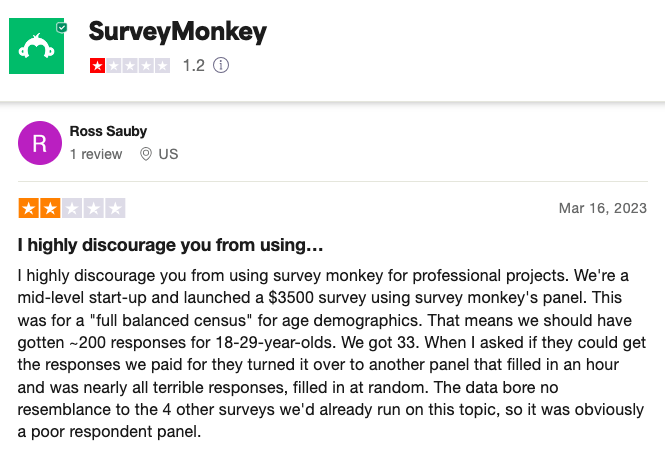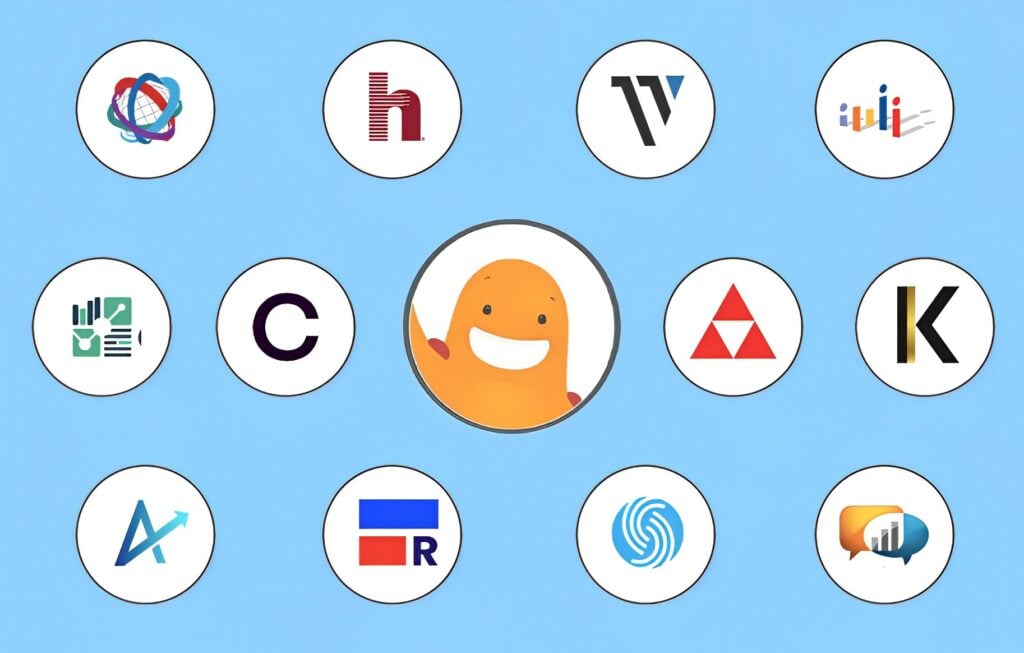When you don’t already have an audience for a survey, you may need to create a panel survey. But what if you don’t have access to a panel? That’s where panel service companies come in. However, some survey making companies like SurveyMonkey also offer panel services of their own. Which is the better option? And is there another option? (Hint: yes, there is). In this blog, we’ll highlight the different options so you can decide which is right for you.
Create your FREE survey and integrate with a panel provider!
What is a Survey Panel Service?
A survey panel company, also known as a panel provider, is a company that has accrued a large pool of potential survey respondents, known as panelists. These individuals have been recruited over time and have agreed to participate in surveys and other market research activities, usually for an incentive such as gift cards. To be considered for surveys, panelists must provide demographic information (e.g., age, gender, location, income). This information is used to categorize and target specific groups for surveys that match their profiles. Some information may drill down even further into specifics about medical history, criminal behavior, and so on.
Online survey panels are often used by businesses, market research firms, academic researchers, and government agencies to gather data and insights on various topics, products, services, or social issues. Panel survey providers are typically able to give these clients access to a large and diverse group of potential survey respondents. They have the ability to target specific demographics and have a streamlined process for survey distribution and data collection.
In addition, a good panel provider will vet panelists carefully to ensure a good match, and perform data cleaning after the survey has been completed to eliminate bias and other factors that can harm data.
8 Panel Survey Considerations
Panel surveys and the companies offering this service differ in a number of ways. Here are some factors to consider when assessing which you will use for your research.
1. Panel Size
The larger the panel, the more it may cost to access. Larger panels often offer a broader range of demographics and target audiences, but they may come with a higher price tag.
2. Survey Complexity
Surveys with more questions, complex skip logic, or multimedia elements may incur additional charges. Some panel research companies charge based on the length or complexity of the survey instrument.
3. Target Audience
If you need to target a specific and hard-to-reach audience, such as healthcare professionals or C-level executives, it may be more expensive to access such specialized panels. If you’re inquiring about very personal topics, such as medical or criminal history, sexual activity, and so on, you’re also likely to be charged a premium as these audiences are harder to reach.
4. Incentives
If you choose to offer incentives to panelists to encourage participation (commonly in the form of cash rewards, gift cards, or points redeemable for prizes), these costs should be factored in. Be sure to read our blog on The Pros & Cons of Survey Incentives.
5. Subscription vs. One-time Use
Some online survey panels offer subscription-based access, where you pay a recurring fee for ongoing access to their panel. Others may charge on a per-survey basis.
6. Geographic Scope
Although the internet makes it easy to reach just about anyone just about anywhere, if you need respondents from very specific geographic regions, you may need to pay more to target those areas.
7. Additional Services
Panel providers may offer additional services, such as survey design, data analysis, and reporting. These services can come at an extra cost.
8. Release of Survey Responses
When you work with a panel provider, you can typically get survey responses directly from them rather than working through a survey tool provider. This way, you only pay the panel provider’s fee and not a reseller’s fee (i.e., a survey tool provider, which will increase the price per response in order to make a profit).
How Does This Differ From a Survey Maker’s Survey Panel?
Many panel providers exist simply to maintain a panel. They work to increase their pool of panelists, improve results, and increase data validity and reliability. Maintaining this panel is their specialty. On the other hand, some popular survey companies, such as SurveyMonkey, also maintain a survey panel of their own. That may sound like an appealing option. However, it’s important to realize that access to the panel isn’t included in the price of the survey-making service.
Accessing a SurveyMonkey panel requires you to pay a separate fee for each response in addition to the survey price or subscription cost. SurveyMonkey states that their panel price “starts” at $1.00 per response. This fee increases based on some of the considerations we highlighted above, such as how niche your target audience is. Additionally, it’s important to remember that a survey-maker company like SurveyMonkey isn’t a true panel provider, as this is not their “full time job.” Therefore, their panel may not be as robust or as reliable as a traditional panel provider.
There are many frustrated SurveyMonkey customers sounding off on the Trustpilot review site. There, the survey maker averages 1.2 stars out of five with negative SurveyMonkey panel reviews such as this one:

You can read additional SurveyMonkey reviews on Trustpilot. If you’re concerned about using a survey maker’s panel service, thankfully there is another option: Integrating your survey with a panel provider.
Integrating SurveyLegend with Panel Providers
Integrating your survey with a panel provider gives you the best of both worlds, and SurveyLegend makes it easy! Once you’ve found the right panel provider, you’ll need to create your survey with SurveyLegend. This will generate a link that you’ll need to provide to the panel provider. So not only are you using a company that specializes in survey making, you’re also accessing a robust panel with a company that specializes in developing them.
Once you’re given the survey panel company the SurveyLegend link, they can send your survey out to people from the demographic(s) of your choice, via e-mail, SMS, WhatsApp or whatever other means they support. The panel service simply appends a unique ID to the survey link sent out to each potential participant. This ID will match participants between the panel provider’s system and the SurveyLegend system. For complete instructions on integrating your SurveyLegend survey with a panel provider, check out our Survey Panel Provider User Guide. Happy surveying!
Have you used an online panel survey in the past? What was your experience? Are you ready to try integrating SurveyLegend with a panel provider? Let us know in the comments!
Create your FREE survey and integrate with a panel provider!
Frequently Asked Questions (FAQs)
A panel provider is a company that has a diverse pool of individuals willing to participate in a survey or research project. Researchers and companies use panel providers to access these individuals, or panelists, and send them surveys, questionnaires, polls, and more.
The cost of using a panel survey provider depends on the individual provider and the complexity of your project and/or survey (e.g., how many survey participants are required, how niche is your target audience, etc).
Integrating SurveyLegend with a panel provider gives you the best of both worlds – you get a free survey making tool (with paid options) plus an experienced panel company.
SurveyMonkey has a TrustScore of 1.2 compared to SurveyLegend’s TrustScore of 4.7.


